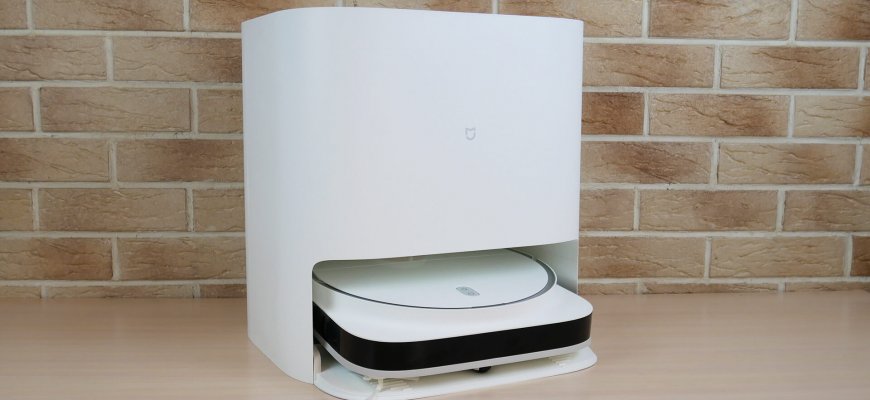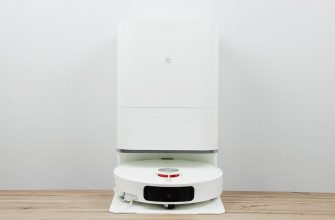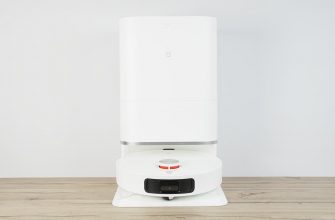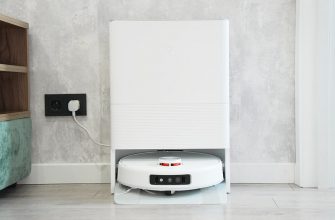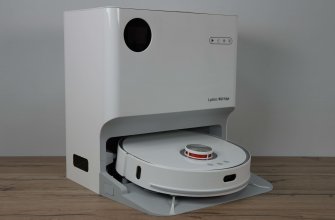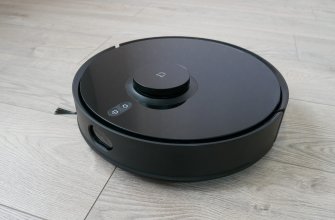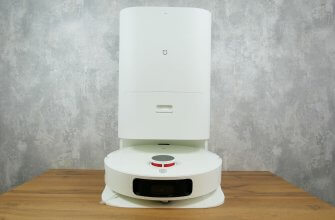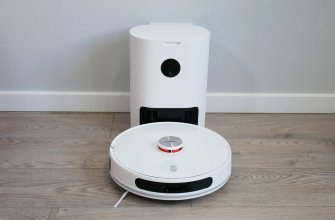Hello everyone. Today we will review an interesting washing robot vacuum cleaner called Xiaomi Mijia Self-Cleaning Robot Vacuum-Mop Pro. Alternative model name for Mijia Pro Self-Emptying Robot Vacuum. To confuse, I recommend refer additionally to the vendor code of the model – STYTJO6ZHM. This device boasts such important design solutions as a station for rinsing mopping pads, two rotating microfiber cloths behind the central brush and a D-shaped body for more efficient sweeping of debris in corners. I am sure that for many of you it will be interesting not only to find out how well Xiaomi Mijia Pro copes with its main task, but also how much better or worse it is than its direct competitor – the twin Dreame Bot W10, which I previously had in the review. And with visual similarities, the difference in price between robots is actually noticeable. Xiaomi Mijia Pro costs about $600, while Dreame Bot W10 is in the range of $850-1000. So today I will try to tell in detail and show all the key features of Xiaomi Mijia Self-Cleaning Robot Vacuum-Mop Pro and compare it with the main competitor from the Dreame factory. Let’s go!
Equipment
In addition to the robot itself and the station for rinsing mopping pads, the delivery set includes:
- Instruction manual in Chinese.
- Power adapter and European standard socket adapter.
- Robot cleaning tool.
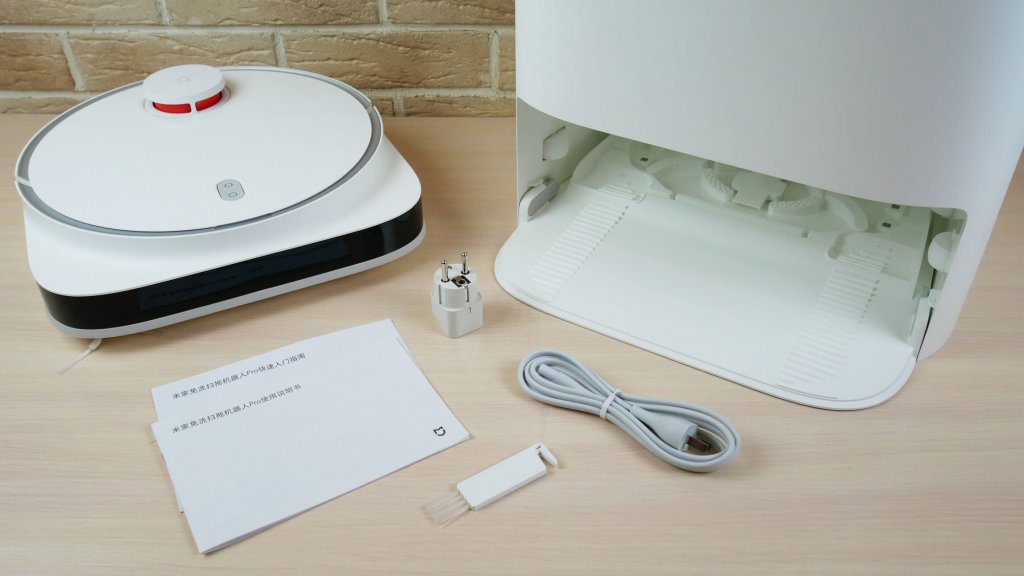
The set is minimal. Spare consumables are not included, unfortunately.
Design
Now let`s have a look at the design of Xiaomi Mijia Pro. Let’s start with the robot itself. Body shape is D-shaped, color is white. A wall sensor is installed on the right side of the bumper.
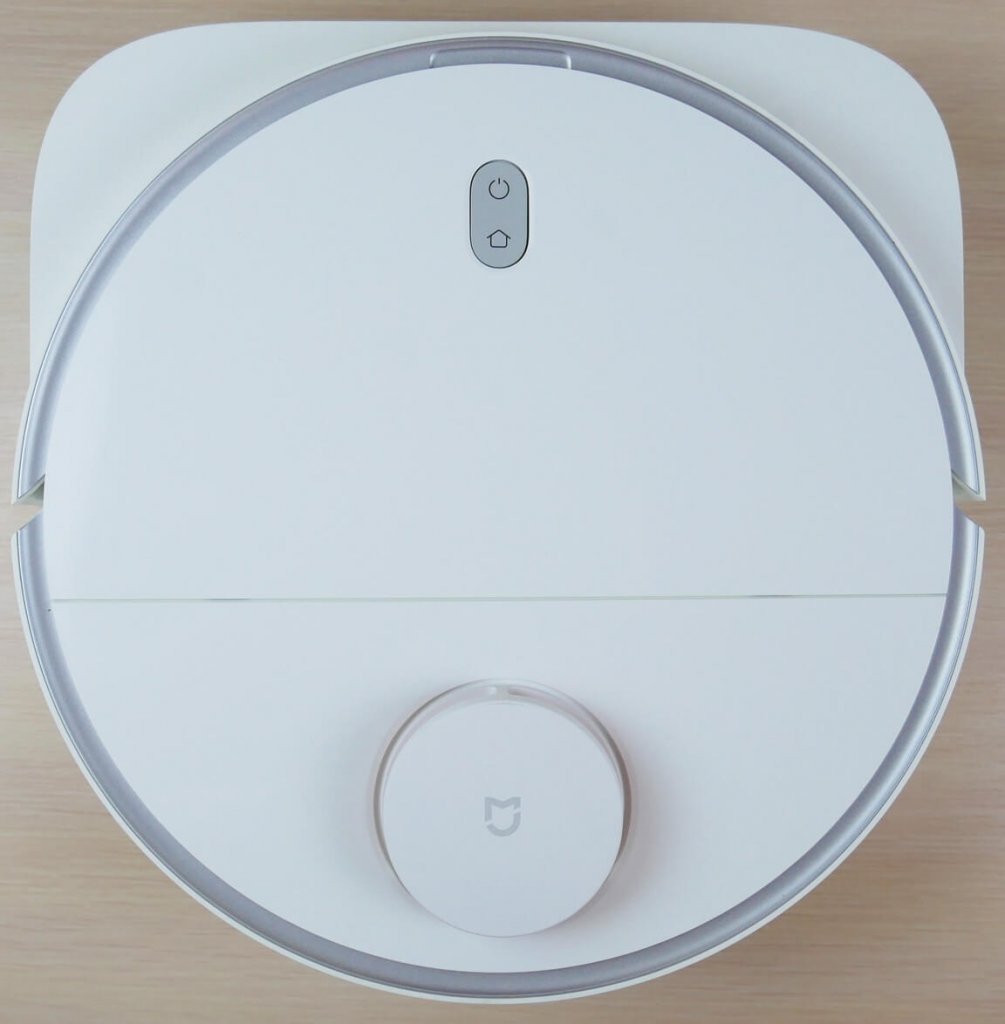
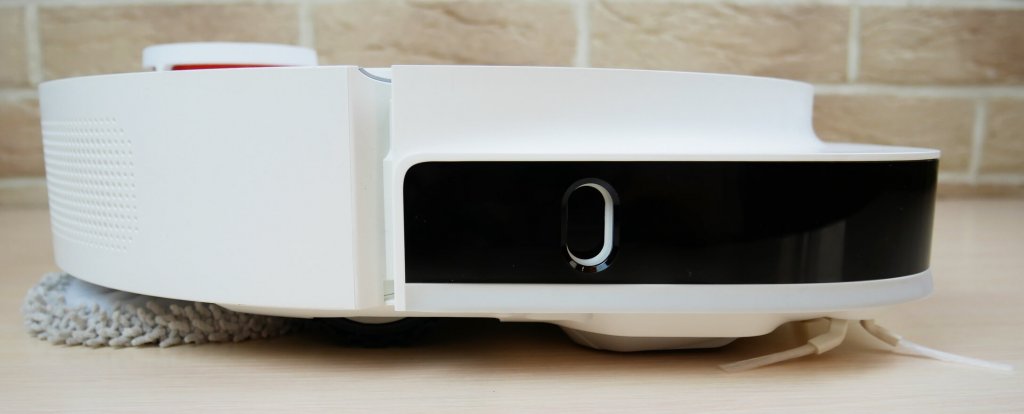
The body height is slightly more than 10.5 cm from the floor. The design of the robot, to be honest, is not for everybody. Dreame Bot W10 looks neater and more stylish in my opinion.
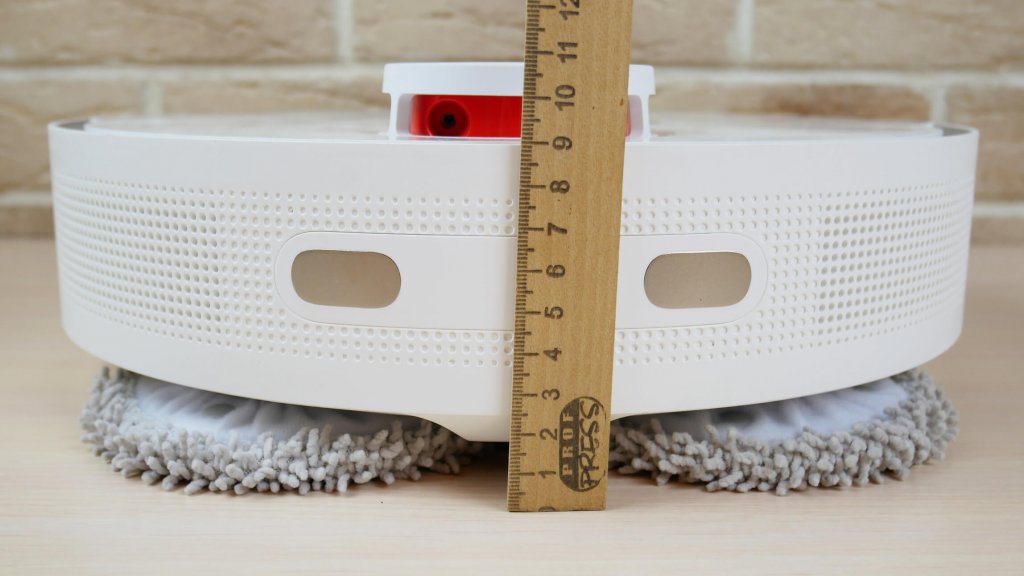
The front part has a soft-touch mechanical bumper. On top of the case there are 2 mechanical control buttons. Lidar is responsible for navigation. It is equipped with a spring-loaded cover that prevents the robot from getting stuck under furniture.
The dust collector is located under the top cover. It holds up to 450 ml of dry debris. Filtration system based on mesh and HEPA filter.

There are 6 fall protection sensors on the bottom of the robot. The ultrasonic carpet detection sensor, like in Dreame Bot W10, is missing.
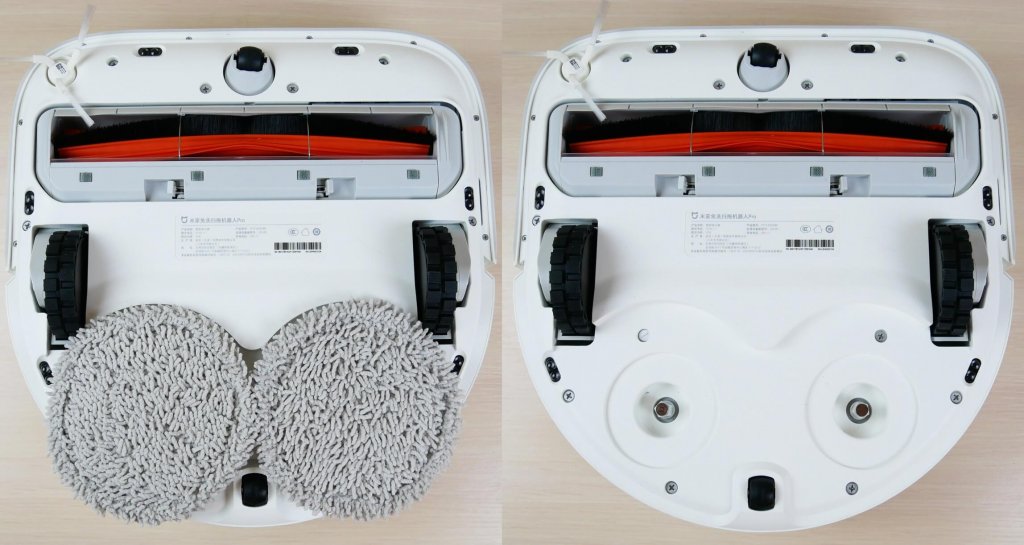
The side brush is one, three-beam, quick-detachable. It is placed right on the corner of the case, which allows the brushes to better enter the corners and sweep the debris.
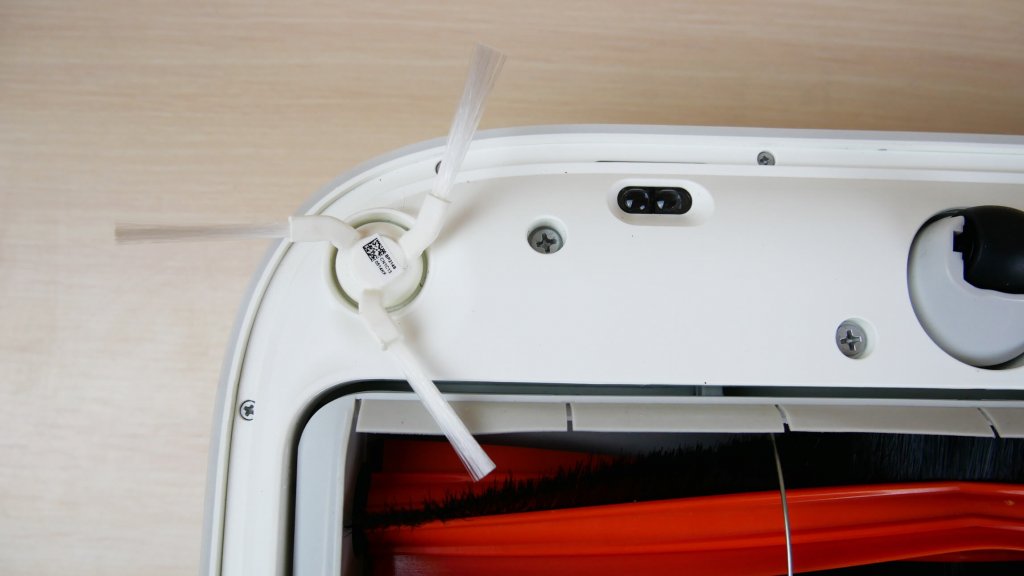
The central brush is bristly-petal. On both sides, it is disassembled for cleaning from wound hair and wool. It is very long!
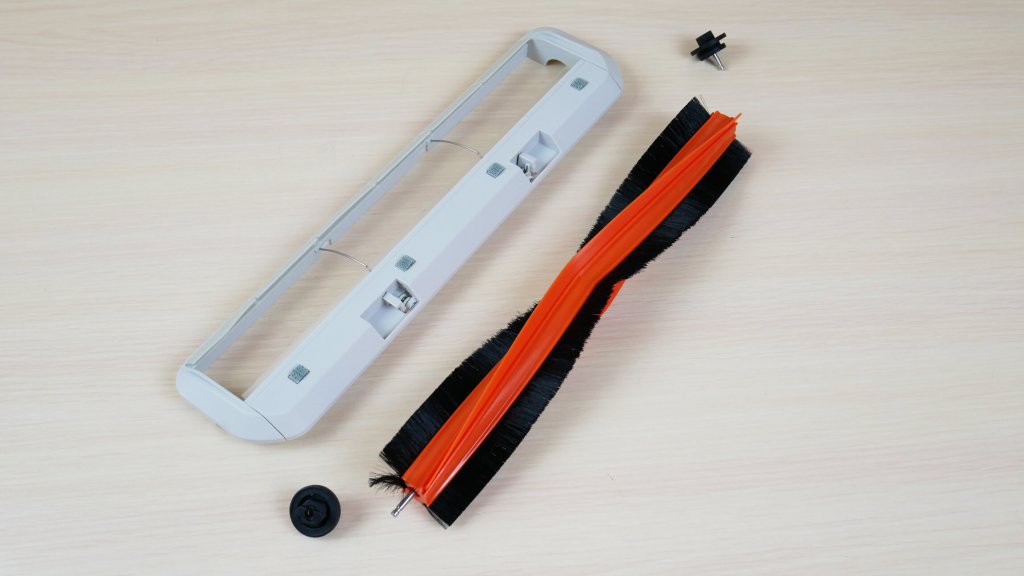
Here, you can visually compare the length of a regular Xiaomi robot vacuum cleaner turbo brush and the length of this elongated brush:
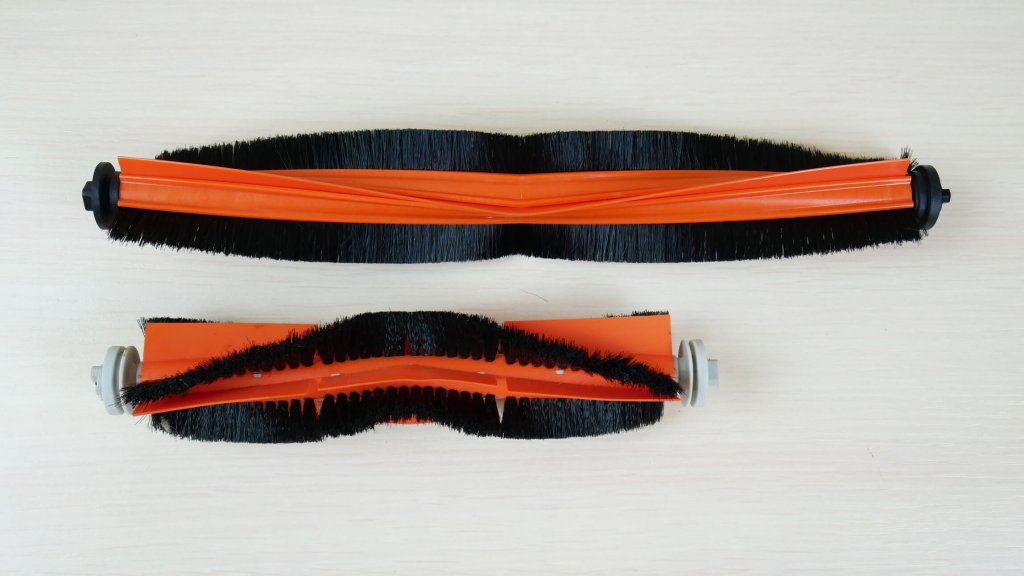
The central brush block is floating, which is a plus.
Mopping pads for washing the floor are quick-detachable. They are held on the robot by magnets. Very easy to remove and install. Behind the mopping pads is another roller.

The station for rinsing the mopping pads, especially the platform for the arrival of the robot, is identical to the one that comes with the Dreame Bot W10. The same combs for cleaning mopping pads and removable platform for easy maintenance.
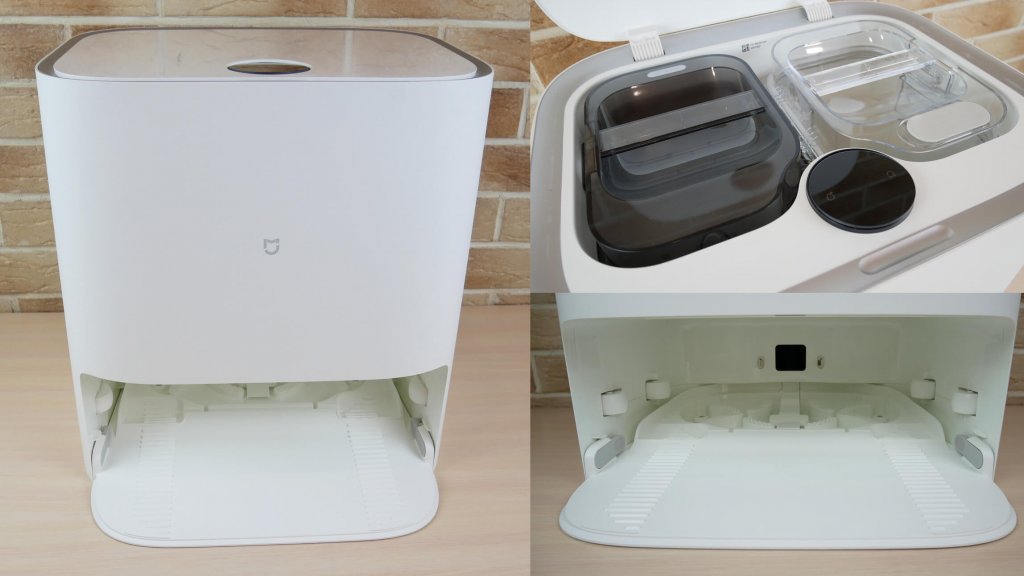
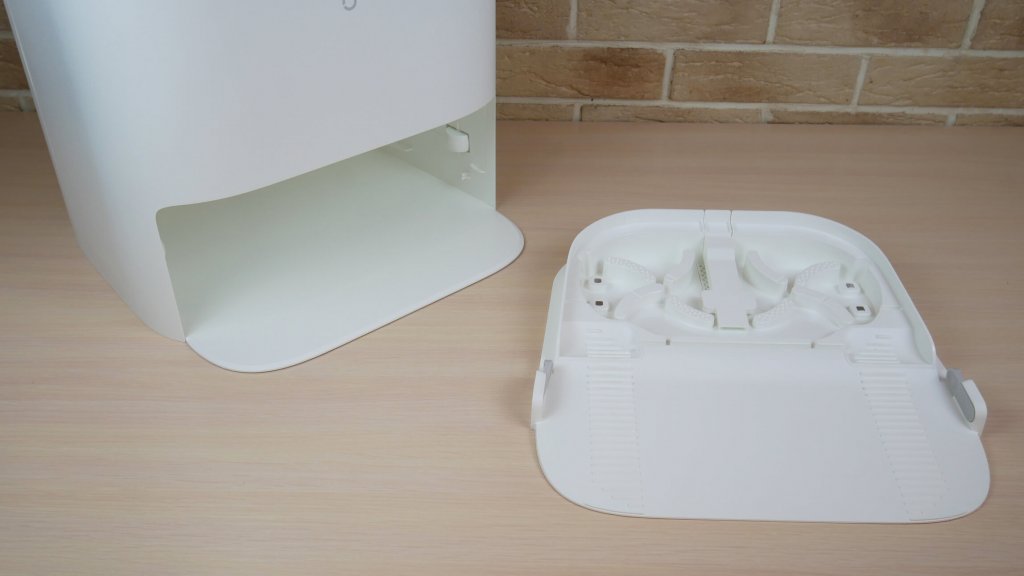
The display on the body is of a different shape, but it also contains touch buttons and information about the status of the robot. Tanks for clean and dirty water are placed under the top cover. They are the same in terms of capacity: each is designed for 4 liters of water.
However, Xiaomi Mijia Self-Cleaning Robot Vacuum-Mop Pro has one important specific feature – the dirty water tank is equipped with an ultraviolet lamp to disinfect dirty water. This is a small design advantage of the robot.

It is also important to note that the mopping pads at the station are not only rinsed, but also automatically dried with hot air, in fact, like the Dreame Bot W10. This is a plus.
In general, the build quality of the robot is above average. There were no special remarks.
Specifications
The main characteristics of Xiaomi Mijia Pro Self-Emptying Robot Vacuum, declared by the manufacturer:
- Battery Li-Ion 5200 mAh
- Suction power Up to 3000 Pa
- Cleaning area Up to 200 sq.m
- Battery life 120 min
- Dust container 450 ml
- Capacity of tanks for dirty and clean water (in the station) 4 l + 4 l
- Passage of obstacles up to 20 mm
- Robot dimensions 343*332*106 mm
- Station dimensions 410*405*430 mm
Functionality
Main Features of Mijia Pro Self-Emptying Robot Vacuum:.
- Management through the application Mi Home.
- Save 1 room map.
- Automatic zoning of premises into rooms.
- Cleaning in selected rooms and areas.
- Adjustment of suction power and degree of wetting of mopping pads.
- Cleaning log.
- Installation of virtual walls and restricted zones, and even separate restriction of zones for the wet cleaning mode.
- Setting cleaning schedule.
- Automatic continuation of cleaning after charging at the station.
- Adjust the volume of voice alerts.
- Do not disturb mode.
- Support for control through voice assistants.
- Disinfection of dirty water with an ultraviolet lamp.
- Setting the frequency of rinsing mopping pads at the station.
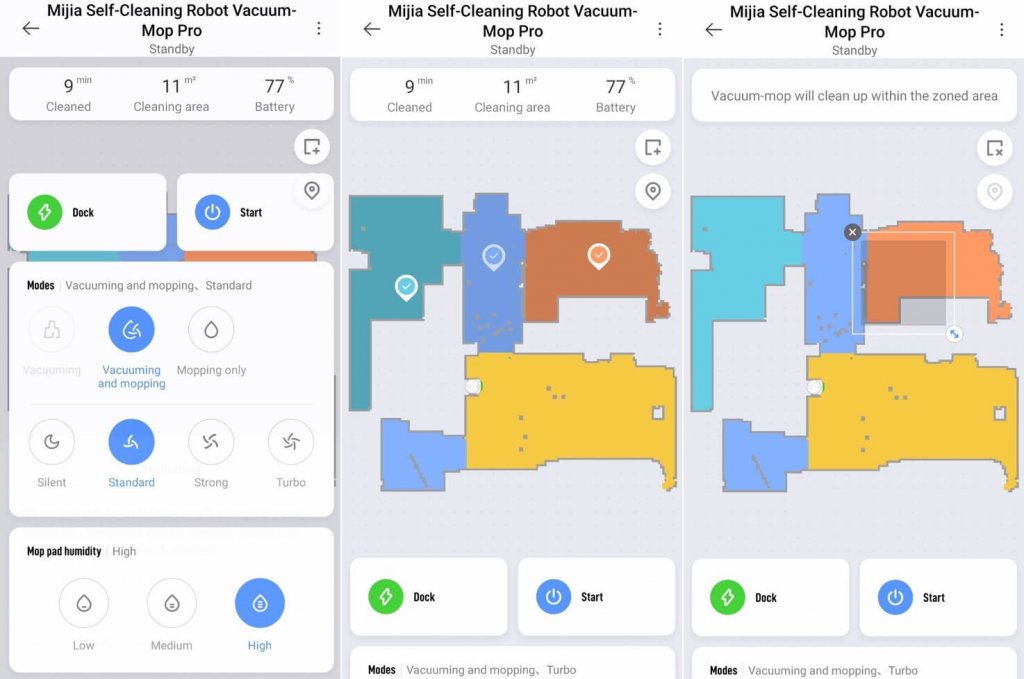
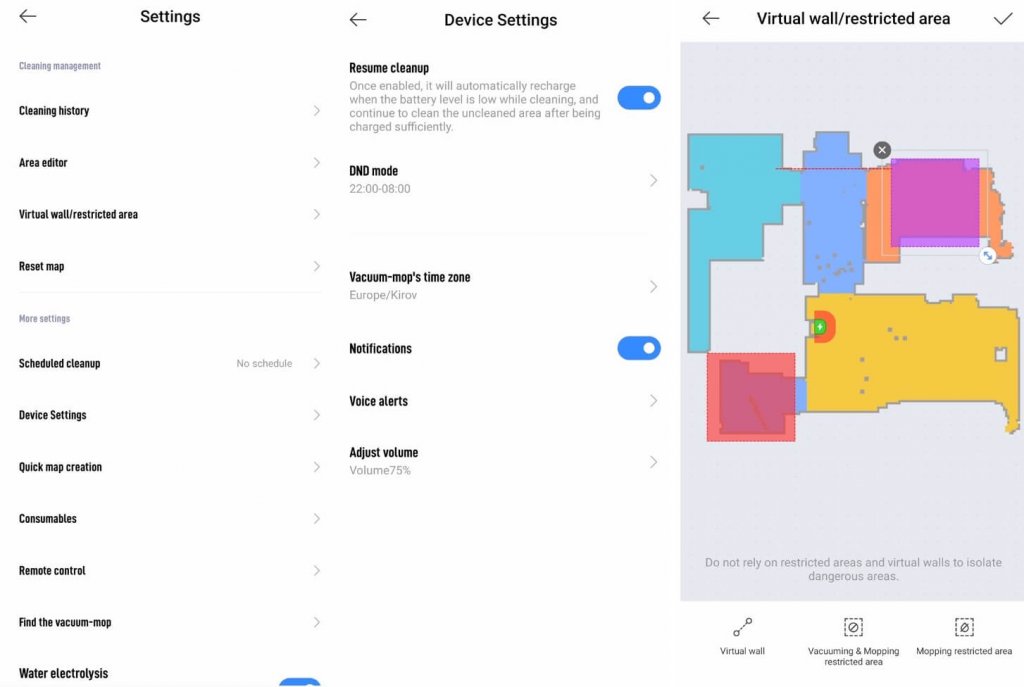
Testing
A detailed video review with all the tests is already published on the channel. I recommend you watching the full video:
Navigation
And finally, let’s move on to the tests. First, let’s check the Xiaomi Mijia Pro navigation in the room with obstacles. The robot got stuck on the legs of the dryer but was able to get out of the trap on its own, continuing the cleaning cycle. It was also able to partially sweep around the legs of the chair and box, after which returned to the base to recharge. Test passed successfully!
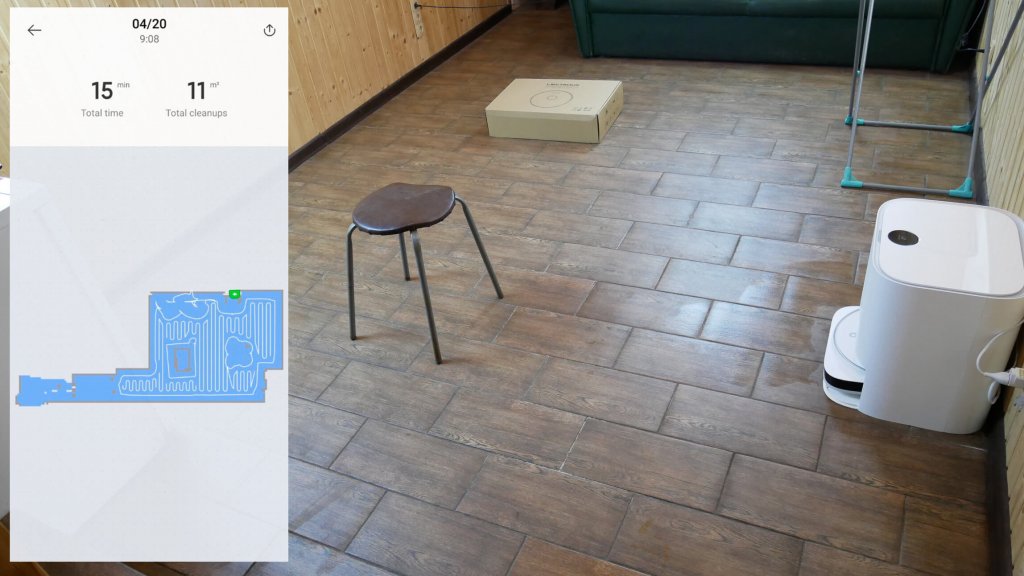
Navigation within the home was tested in dry cleaning mode to ensure that the robot was able to overcome carpets and drive through the entire available area. So, the navigation of Xiaomi Mijia Pro is good. Robot cleans room after room, first along the perimeter, then with a snake. There are no uncleaned areas left. This test is also passed!
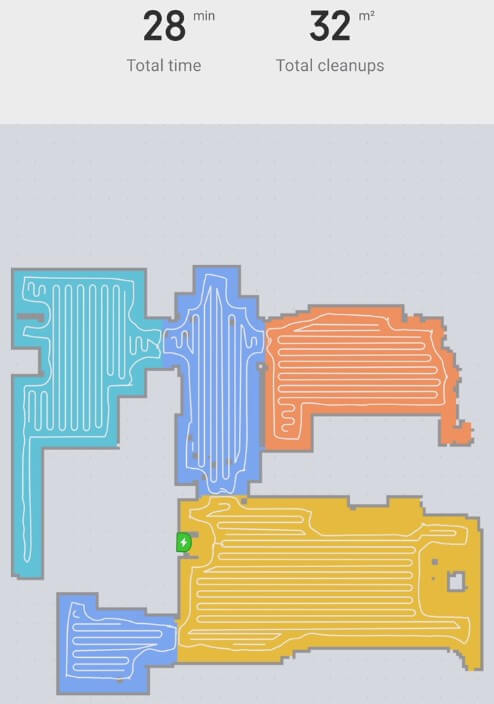
Suction power
In terms of suction power, Xiaomi Mijia Pro was only able to suck out debris from a 2mm gap. This is a pretty standard result. At the same time, Dreame Bot W10 is actually more powerful, it was able to suck out debris even from a 4 mm gap. Anyway, this power is enough to maintain cleanliness in the house. Especially if there are no carpets.
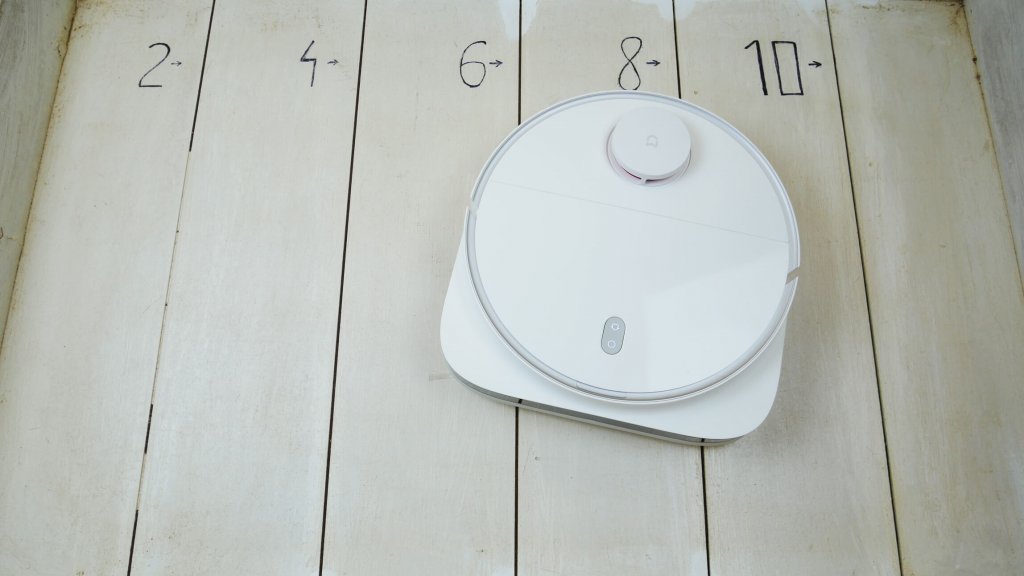
Dry cleaning
The quality of garbage collection on the laminate is very high. The robot was able to collect garbage of various structures, including wool and hair. In addition, it is important to note that Xiaomi Mijia Pro is really capable of thoroughly sweeping debris in the corners, not always the first time though. Test passed successfully!

Carpet cleaning
The quality of cleaning on the carpet is high, the robot was able to collect all the garbage, carefully cleaning the carpet with brushes, I have no complaints.

Wiping off the dirt
Xiaomi Mijia Pro effectively copes with rubbing off the dried dirt. Only the area along the plinth remained unwashed, but this is the blind zone of all the robot vacuum cleaners that I had on the test. This also applies to Dreame Bot W10.

Removing tough stains
With rubbing off difficult dirt, for example, dried stains from coffee and sauce, Xiaomi Mijia Pro has serious problems. It is able to wipe off coffee with several attempts, but cannot do the sauce. Robot could only partially remove the sauce stains. But from the 4th time. This is not a criticism, just information for your comparison.

For example, the Dreame Bot W10 also failed in this test, but the Hobot Legee 7 does a better job thanks to movable platforms with mopping pads that wipe off the dirt more efficiently.
Wet cleaning and carpets
As for the simultaneous dry and wet cleaning in the presence of carpets in the house, Xiaomi Mijia Pro does not recognize carpets, so it drives into them in wet cleaning mode. I recommend protecting the carpets with separate restricted areas for the wet cleaning mode so that the robot does not stain or spoil them.
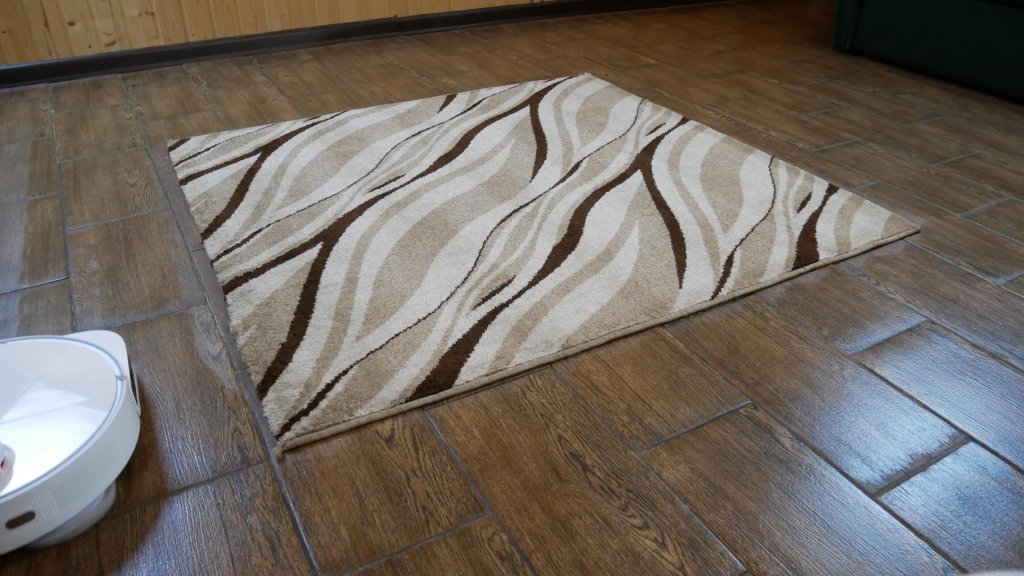
On the other hand, a big plus of Xiaomi Mijia Pro is that it can simultaneously vacuum and mop the floor while rinsing mopping pads during the cleaning cycle so that the cleaning quality was not affected. Here, look how well this robot vacuums the floor on which I scattered various garbage. Very high-quality of floor cleaning.
But again, I remind you, a small area along the plinth remains unwashed due to design features.

The quality of rinsing mopping pads is good. They are not perfectly clean, but to keep the house clean under not critical conditions, the station does its job well.
Passage of obstacles
Passage of obstacles is pretty good. Even with the mopping pads installed, the robot vacuum cleaner was able to overcome the 2 cm plinth. This is a big plus for the robot!
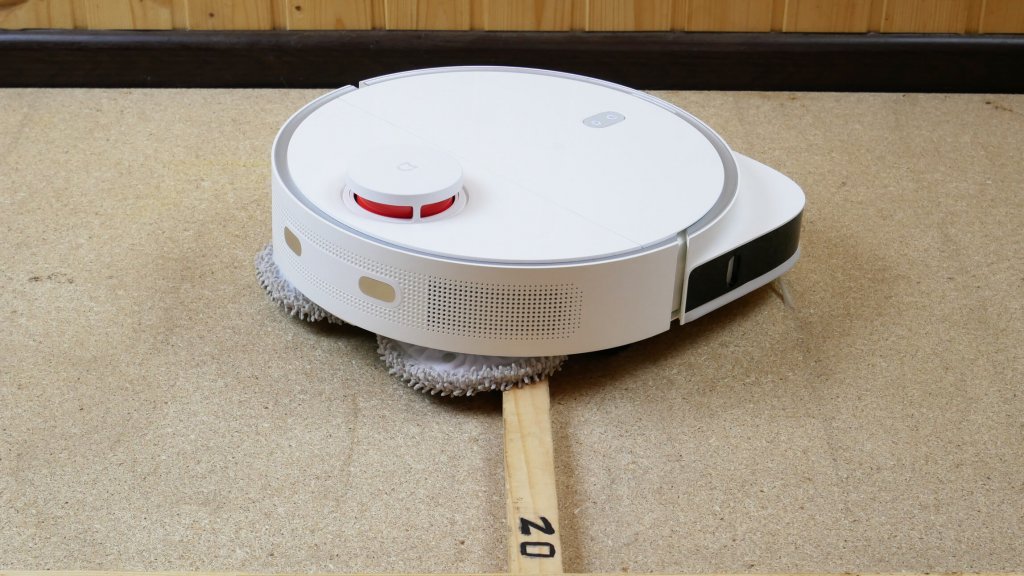
Drive through dark surfaces
Well, one more advantage of the robot is that it is not afraid of dark surfaces, unlike most other robot vacuum cleaners of the Xiaomi line and not only.
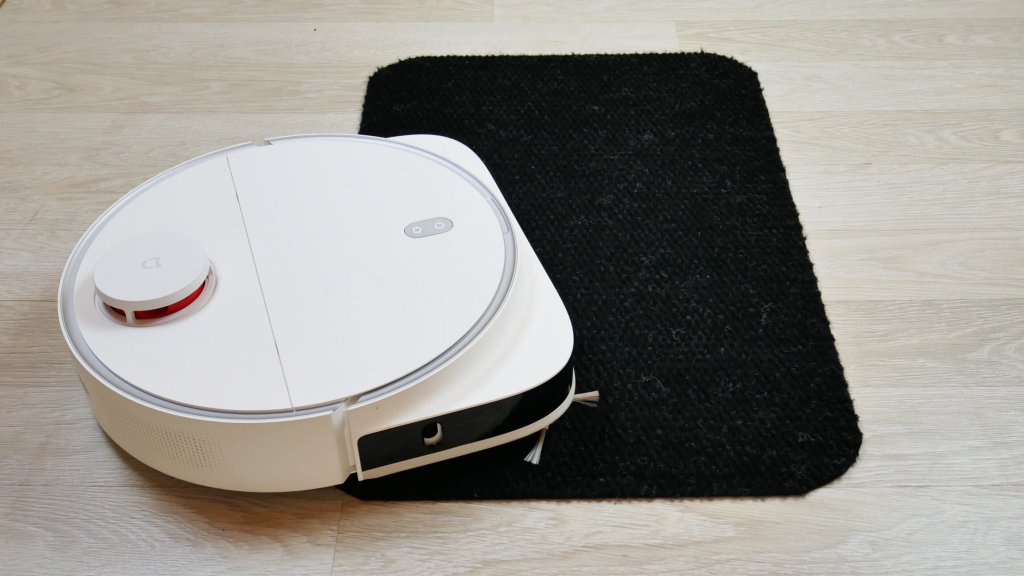
Noise level
And finally, we measured the noise level of Xiaomi Mijia Pro in different modes. With the suction turned off, the noise level is about 54 dB. At minimum power, it rises to 57 dB. At medium power, the noise level reaches 61 dB, and at maximum power, the peak value was 65 dB. The noise level of Xiaomi Mijia Pro is low, like in Dreame. This is a plus.
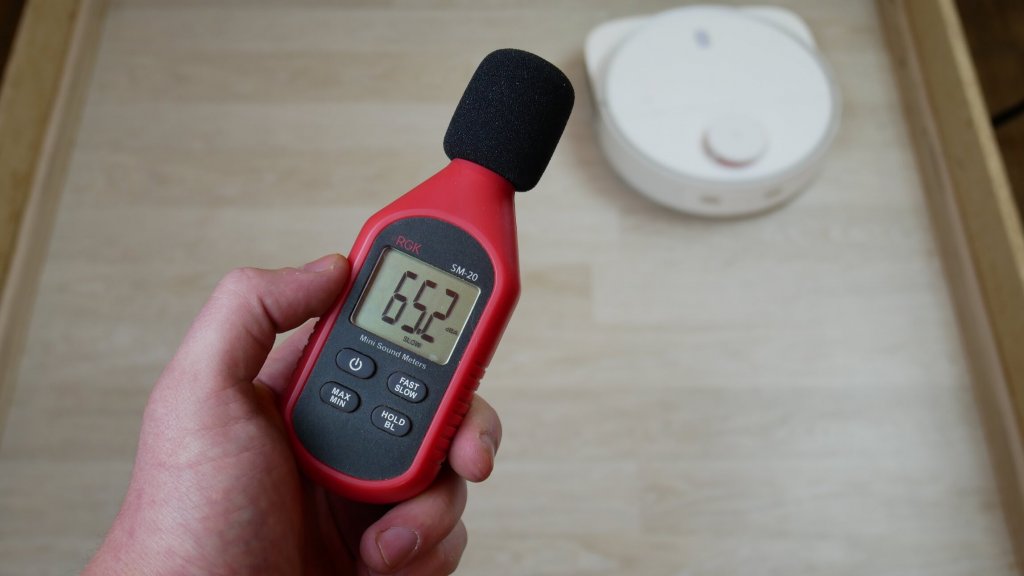
Summing up
Xiaomi Mijia Self-Cleaning Robot Vacuum-Mop Pro was reviewed and tested in detail. It managed to score 121 points in our overall rating of robots that passed the Robotobzor test. I will share my own opinion about the robot vacuum cleaner after testing the robot. What I liked:
- High-quality wet cleaning on large areas thanks to the station for rinsing mopping pads and rotating platforms with mopping pads.
- Well sweeps debris in the corners.
- Overall, good dry cleaning on both hard floors and carpets.
- Good navigation.
- The robot vacuum cleaner is not afraid of dark surfaces.
- Sterilization of dirty water with ultraviolet lamp.
- Low noise level.
- Convenient price, as for a robot vacuum cleaner with a station for rinsing mopping pads.
Well, this robot also has many shortcomings. For example:
- Does not recognize carpets.
- Keeps only 1 map in memory.
- Does not wash a narrow area along the plinth.
- Small capacity of the dust collector.
- There is no possibility to flexibly adjust the cleaning parameters for each room.
Well, if you compare this robot with flagship models from other brands, then you can still highlight the following disadvantages:
- No self-cleaning available.
- Does not recognize objects on the floor.
- The cleaning module with mopping pads does not rise when driving on carpets.
If for you the listed disadvantages are not significant and high-quality dry and wet cleaning on hard floors and large areas is a priority, I think that this robot vacuum cleaner definitely deserves your attention. In terms of cleaning quality, it is not less than in Dreame Bot W10. Even better sweeps in corners, just less power, which reduces the effectiveness of cleaning carpets. Definitely, it is slightly less in functionality, but the price is significantly cheaper. So, for its price – this is a very interesting option to buy and in most cases the savings will be justified.
If the cost is not so important for you, and you just can’t figure out whether it’s worth paying extra for Dreame, I think it’s still worth it if ease of use is important. And if the main concern is how the robot will perform its main task, then here you most likely will not feel the difference.
On this note, I would like to end the review. If you have any questions, ask them in the comments below the video. Don’t forget to subscribe and like this review. Happy tech shopping. Bye!

